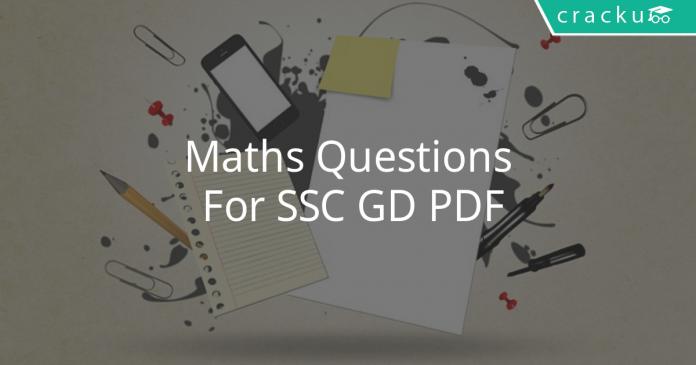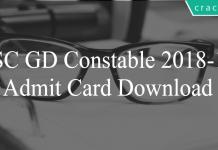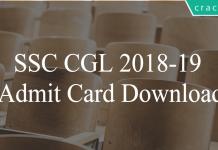Maths Questions For SSC GD PDF Set-2
SSC GD Constable Maths Question and Answers download PDF based on previous year question paper of SSC GD exam. 40 Very important Maths questions for GD Constable.
MATHS QUESTIONS FOR SSC GD PDF
GET 20 SSC GD MOCK FOR JUST RS. 117
Question 1: $7\Large\frac{1}{5}$ $+$ $2\Large\frac{1}{3}$ $-$ $4\Large\frac{2}{15}$ $-$ $3\Large\frac{5}{18}$ $+$ $5\Large\frac{2}{9}$ $=$?
a) $5\large\frac{35}{78}$
b) $7\large\frac{31}{90}$
c) $9\large\frac{36}{73}$
d) $4\large\frac{37}{79}$
e) None of these
Question 2: $\Large\frac{628}{60}$ $-$ $\Large\frac{44}{45}\div\frac{6}{9}$ $+$ $\Large\frac{575}{624}\div\frac{25}{104}$ $+$ $\Large\frac{13}{15}\div\frac{2}{5}$ $=$ $\large?$
a) 15
b) 25
c) 10
d) 14
e) None of these
Question 3: $15.921$ $+$ $9.679$ $+$ $101.36$ $-$ $94.76$ $=$ $17.976$ $+$ $6.224$ $+$ ?
a) 7
b) 5
c) 8
d) 9
e) None of these
Question 4: $\sqrt{1936}\div\sqrt[3]{1331}\times\sqrt{50625}\div\sqrt{14400}\times\sqrt{64}$ $=$ $7920\div132$ $+$ ?
a) 1
b) -3
c) 0
d) -1
e) None of these
Question 5: $522\div150\times25$ $+$ $96\div180\times15$ $-$ $\Large\frac{1125}{135}$ $\div$ $\Large\frac{5}{9}$ $=$ ?
a) 80
b) 75
c) 105
d) 65
e) None of these
Question 6: फॉर्म कुल्हाड़ी + + = = 0. द्वारा एक समीकरण, जहां, एक ≠ 0, बी ≠ 0 और सी = 0 एक सीधी रेखा का प्रतिनिधित्व करता है जो गुजरता है
a) (2, 4)
b) (0, 0)
c) (3, 2)
d) इनमे से कोई नहीं
Question 7: अनुक्रम का पांचवां शब्द जिसके लिए $t_{1}=1$ , $t_{2}=2$ और $t_{n+2}$ = $t_{n}+t_{n+1}$ , है
a) 5
b) 10
c) 6
d) 8
Question 8: यदि एक्स = 0.3 $\times$ 0.3, एक्स का मान है
a) 0.009
b) 0.03
c) 0.09
d) 0.08
Question 9: What would come in place of ($) mark in the following equation ?
* 2 $ 20 ÷ 156 = 145
a) 6
b) 2
c) 4
d) 0
Question 10: If $\ x^{2}+9y^{2}\ $= 6xy, then x: y is
a) 1 : 3
b) 3 : 2
c) 3 : 1
d) 2 : 3
DOWNLOAD APP TO ACESS DIRECTLY ON MOBILE
Question 11: Which value among $3^{200},\ 2^{300}\ and\ 7^{100}$ is the largest?
a) $3^{200}$
b) $2^{300}$
c) $7^{100}$
d) All are equal
Question 12: In a class, there are 40 students. Some of them passed the examination and others failed. Raman’s rank among the student who have passed is 13 th from top and 17 th from bottom. How many students have failed?
a) 11
b) 10
c) 9
d) Cannot be determined
Question 13: By interchanging which two signs the equation will be correct?
25 + 18 ÷ 2 – 4 = 20
a) + and ÷
b) + and –
c) ÷ and –
d) None of these
Question 14: If 85 x 5 – 3 = 20 and 18 x 2 – 1 = 10, then 100 x 20 – 5 = ?
a) 15
b) 20
c) 10
d) 13
Question 15: If ‘P’ means ‘+’, ‘Q’ means ‘-’, ‘R’ means ‘÷’ and ‘S’ means ‘x’, then which of the following equation is correct?
a) 14 R 7 S 6 P 4 Q 3 = 11
b) 3 S 6 P 2 Q 3 R 6 = 35/2
c) 11 R 12 S 48 P 10 Q 6 = 48
d) 9 S 8 P 6 R 4 S 8 = 80
FREE SSC PRACTICE SET (DAILY TEST)
Question 16: By interchanging which two signs the equation will be correct?
16 + 31 – 3 x 93 ÷ 11 = 966
a) + and –
b) – and ÷
c) ÷ and x
d) x and +
Question 17: If 13 L 4 A 7 = 41 and 14 A 3 L 12 = 54, then 12 L 3 A 9 = ?
a) 84
b) 39
c) 42
d) 56
Question 18: Which of the following statement is/are true ? I. $\sqrt{144}\times\sqrt{36}<\sqrt[3]{125}\times\sqrt{121}$
II.$\sqrt{324}+\sqrt{49}>\sqrt[3]{216}\times\sqrt{9}$
a) Only I
b) Only II
c) Neither I nor II
d) Both I and II
Question 19: Which of the following is the correct rationalize form of $\frac{15}{\sqrt{5}+2}=?$
a) $5\sqrt{5}-6$
b) $5\sqrt{5}-30$
c) $15\sqrt{5}-30$
d) $45\sqrt{5}-630$
Question 20: If $\sqrt[3]{7}+\sqrt{343}=19.21$, then find the value of $\sqrt{252}+20\sqrt{7}$
a) 39.4
b) 49.9
c) 56.8
d) 92.3
Question 21: Find the least number among $\frac{5}{9},\sqrt\frac{9}{49},0.43$ and $(0.7)^{2}.$
a) $\frac{9}{5}$
b) $(0.7)^{2}$
c) $\sqrt\frac{9}{49}$
d) 0.43
Question 22: What is the value of $(\frac{\sqrt{2}}{3}-Cosec 60^\circ)?$
a) $\frac{(\sqrt{6}-6)}{3\sqrt{3}}$
b) $\frac{(2-2\sqrt{3})}{\sqrt{3}}$
c) $\frac{(1-\sqrt{6})}{\sqrt{2}}$
d) $\frac{(4-\sqrt{3})}{2\sqrt{3}}$
Question 23: What is the value of $\sqrt{1054 +\sqrt{196}+\sqrt{169}+\sqrt{64}}$ ?
a) 33
b) 37
c) 29
d) 31
Question 24: What is the positive square root of $[19+4\sqrt21]?$
a) $\sqrt{7}+2\sqrt{3}$
b) $\sqrt{3}+2\sqrt{7}$
c) $\sqrt{2}+3\sqrt{7}$
d) $\sqrt{7}+3\sqrt{3}$
Question 25: Find ‘x’ if $\sqrt{(2+7x)}=\sqrt{(3x+4)}$
a) 0.5
b) 1
c) 1.5
d) 2
Question 26: What is the square root of $\frac{(3-2\sqrt2)}{(3+2\sqrt2)}$ ?
a) $3-2\sqrt2$
b) $3+2\sqrt2$
c) $1$
d) $17$
Question 27: What is the square root of $\frac{(3-2\sqrt2)}{(3+2\sqrt2)}?$
a) $3-2\sqrt2$
b) $3+2\sqrt2$
c) $1$
d) $$17$
Question 28: Find the value of $\sqrt{(2x-5)^{2}}+2\sqrt{(x-1)^{2}}$, if 1<x<2.
a) 1
b) 2
c) 3
d) 4
Question 29: What is the value of $(\frac{1}{\sqrt{3}}+\cos60^\circ)$ ?
a) $\frac{(2+2\sqrt3)}{\sqrt{3}}$
b) $\frac{(2+\sqrt3)}{2\sqrt{3}}$
c) $\frac{7}{3}$
d) $\frac{(\sqrt{2}+1)}{\sqrt{2}}$
Question 30: If $x=\frac{\sqrt2+1}{\sqrt2-1}$ and $y=\frac{\sqrt2-1}{\sqrt2+1}$, then what is the value of x+y ?
a) $6$
b) $\sqrt2$
c) $3$
d) $3\sqrt2$
Question 31: What is the simplified value of $\frac{\sqrt{5}+\sqrt{4}}{\sqrt{5}-\sqrt{4}}+\frac{\sqrt{5}-\sqrt{4}}{\sqrt{5}+\sqrt{4}}$ ?
a) 9
b) 10
c) 18
d) 20
Question 32: What is value of $(6x^2 – 5y^2)(6x^2 + 5y^2)$, If $x=\frac{1}{\sqrt{3}}$ and $y=\frac{1}{\sqrt{5}}$ ?
a) 2
b) 3
c) 4
d) 5
Question 33: What is the value of $(cosec 60^\circ – \frac{1}{2})$
a) $\frac{(4-\sqrt{3})}{2\sqrt{3}}$
b) $\frac{(2\sqrt{3}-1)}{\sqrt{3}}$
c) $\frac{(3\sqrt{3}-1)}{3}$
d) $\frac{1}{\sqrt{3}}$
Question 34: If $\sqrt{21}=4.58$, then what is the simplified value of $(8\sqrt{\frac{3}{7}}-3\sqrt{\frac{7}{3}})$ ?
a) 0.474
b) 0.752
c) 0.655
d) 1
Question 35: Arrange the following in descending order.
$\sqrt[4]{5},\sqrt[3]{4}$ and $\sqrt[4]{6}$
a) $\sqrt[4]{6}>\sqrt[3]{4}>\sqrt[4]{5}$
b) $\sqrt[4]{6}>\sqrt[4]{5}>\sqrt[3]{4}$
c) $\sqrt[3]{4}>\sqrt[4]{5}>\sqrt[4]{6}$
d) $\sqrt[3]{4}>\sqrt[4]{6}>\sqrt[4]{5}$
Question 36: Which of the following relation is CORRECT?
I. $(\sqrt{15}+\sqrt{7})<(2\sqrt{22})$
II. $(\sqrt{17}+\sqrt{5})<(\sqrt{20}+\sqrt{2})$
a) Only I
b) Only II
c) Neither I nor II
d) Both I and II
Question 37: Which of the following statement (s) is / are TRUE ?
I. $\sqrt{676}+\sqrt{6.76}+\sqrt{0.0676}=27.76$
II. $\sqrt{339+\sqrt{36}+\sqrt{49}+\sqrt{81}}=19$
a) Only I
b) Only II
c) Neither I nor II
d) Both I and II
Question 38: Determine the value of m for which $4x+\frac{\sqrt{x}}{6}+\frac{m^2}{4}$ is a perfect square.
a) $\frac{1}{24}$
b) $\frac{1}{12}$
c) $12$
d) $24$
Question 39: Calculate the value of x, If $\sqrt{1-(\frac{x}{529}})=(\frac{16}{23})$
a) 283
b) 276
c) 273
d) 374
Question 40: If X=1.1, then what is the value of $\sqrt{4x^2-4x+1}$ ?
a) 1.21
b) 1.331
c) 2.21
d) 1.2
Answers & Solutions:
1) Answer (B)
7$\frac{1}{5}$+2$\frac{1}{3}$-4$\frac{2}{15}$-3$\frac{5}{18}$+5$\frac{2}{9}$
= 7+2-4-3+5+$\frac{1}{5}$+$\frac{1}{3}$-$\frac{2}{15}$-$\frac{5}{18}$+$\frac{2}{9}$
=7+ $\frac{18+30-12-25+20}{90}$
= 7$\frac{31}{90}$
2) Answer (A)
$\Large\frac{628}{60}$ $-$ $\Large\frac{44}{45}\div\frac{6}{9}$ $+$ $\Large\frac{575}{624}\div\frac{25}{104}$ $+$ $\Large\frac{13}{15}\div\frac{2}{5}$
$=$ $\Large\frac{314}{30}$ $-$ $\Large\frac{44}{30}$ $+$ $\Large\frac{115}{30}$ $+$ $\Large\frac{65}{30}$
$=$ $\Large\frac{450}{30}$ $=15$
3) Answer (C)
$15.921$ $+$ $9.679$ $+$ $101.36$ $-$ $94.76$ $-$ $17.976$ $-$ $6.224$ $=$ ?
Adding all Positive terms:
$15.921$ $+$ $9.679$ $+$ $101.36$ $=$ $126.96$
Adding all Negative terms:
$94.76$ $+$ $17.976$ $+$ $6.224$ $=$ $118.96$
$126.96$ $-$ $118.96$ $=$ $8$
4) Answer (C)
$\large\sqrt{1936}\div\sqrt[3]{1331}\times\sqrt{50625}\div\sqrt{14400}\times\sqrt{64}$ $-$ $\large7920\div132$ $=$ ?
$\Large\frac{44}{11}$ $\times$ $\Large\frac{225}{(\Large\frac{120}{8})}$ $-$ $\Large\frac{7920}{132}$
$4$ $\times$ $15$ $-$ $60$ $=$ $0$
5) Answer (A)
$522\div150\times25$ $=$ $87$
$96\div180\times15$ $=$ $8$
$\Large\frac{1125}{135}$ $\div$ $\Large\frac{5}{9}$ $=$ $15$
$87$ $+$ $8$ $-$ $15$ $=$ $80$
6) Answer (B)
सी = 0 के रूप में, और समीकरण में बिंदु (0,0) को प्रतिस्थापित करने के लिए, हमें बिंदु (0,0) पर ax + by + c = 0 मिलता है।
इसलिए, रेखा मूल के माध्यम से गुजरती है।
7) Answer (D)
$t_{1}=1$ , $t_{2}=2$
$t_{n+2}$ = $t_{n}+t_{n+1}$
n = 3 $t_{5}$ , फिर $t_{5}$ = $t_{3}+t_{4}$
$t_{3}$ = $t_{1}+t_{2}$ = 1 + 2 = 3
$t_{4}$ = $t_{2}+t_{3}$ = 2 + 3 = 5
$t_{5}$ = $t_{3}+t_{4}$ = 3 + 5 = 8
तो जवाब विकल्प डी है।
8) Answer (C)
0.3 * 0.3 = 0.0 9
9) Answer (A)
10) Answer (C)
$x^{2}+9y^{2}$=6xy
$\Rightarrow x^{2}-6xy+9y^{2}$=0
$\Rightarrow (x-3y)^{2}$=0
$\Rightarrow$ x-3y=0
$\Rightarrow$ x=3y
$\Rightarrow \frac{x}{y}$=$\frac{3}{1}$
$\therefore$ x:y=3:1
11) Answer (A)
Terms = $3^{200},\ 2^{300}\ and\ 7^{100}$
Dividing all the exponents by 100, we get :
$\equiv3^2,2^3,7^1$
= $9,8,7$
Thus, the largest number = $9\equiv3^{200}$
=> Ans – (A)
12) Answer (A)
Total number of students = 40
Among the student who have passed, Raman’s rank from top = 13th
Raman’s rank from bottom = 17th
=> Total students who passed = $(13+17)-1=30-1=29$
$\therefore$ Number of students who have failed = $40-29=11$
=> Ans – (A)
13) Answer (B)
Expression : 25 + 18 ÷ 2 – 4 = 20
(A) : + and ÷
$\equiv25\div18+2-4=20$
L.H.S. = $1.39-2=-0.61\neq20$
(B) : + and –
$\equiv25-18\div2+4=20$
L.H.S. = $25-9+4=20$
=> Ans – (B)
14) Answer (C)
The pattern followed is $\times$ is replaced by $\div$ and $-$ is replaced by $+$
Eg :- 85 x 5 – 3 = $\frac{85}{5}+3=17+3=20$
and 18 x 2 – 1 = $\frac{18}{2}+1=9+1=10$
Similarly, 100 x 20 – 5 = $\frac{100}{20}+5=5+5=10$
=> Ans – (C)
15) Answer (C)
Given : ‘P’ means ‘+’, ‘Q’ means ‘-’, ‘R’ means ‘÷’ and ‘S’ means ‘x’
(A) : 14 R 7 S 6 P 4 Q 3 = 11
L.H.S. = $14\div7\times6+4-3$
= $12+1=13\neq$ R.H.S.
(B) : 3 S 6 P 2 Q 3 R 6 = 35/2
L.H.S. = $3\times6+2-3\div6$
= $18+2-0.5=19.5=\frac{39}{2}\neq$ R.H.S.
(C) : 11 R 12 S 48 P 10 Q 6 = 48
L.H.S. = $11\div12\times48+10-6$
= $44+4=48=$ R.H.S.
=> Ans – (C)
16) Answer (B)
Expression : 16 + 31 – 3 x 93 ÷ 11 = 966
By exchanging :
(A) + and –
L.H.S. = $16-31+3\times93\div11$
= $-15+25.36=10.36\neq$ R.H.S.
(B) – and ÷
L.H.S. = $16+31\div3\times93-11$
= $16+(31\times31)-11$
= $5+961=966=$ R.H.S.
=> Ans – (B)
17) Answer (B)
Expression : 13 L 4 A 7 = 41
The pattern followed is : $A\rightarrow\times$ and $L\rightarrow+$
=> $13+(4\times7)=41$
and Similarly, $14\times3+12=54$
$\therefore$ 12 L 3 A 9
= $12+3\times9=12+27=39$
=> Ans – (B)
18) Answer (B)
I : $\sqrt{144}\times\sqrt{36}<\sqrt[3]{125}\times\sqrt{121}$
L.H.S. = $12\times6=72$
R.H.S. = $5\times11=55$
Thus, L.H.S. > R.H.S.
II : $\sqrt{324}+\sqrt{49}>\sqrt[3]{216}\times\sqrt{9}$
L.H.S. = $18+7=25$
R.H.S. = $6\times3=18$
Thus, L.H.S. > R.H.S., which is correct.
$\therefore$ Only II is correct.
=> Ans – (B)
19) Answer (C)
Expression : $\frac{15}{\sqrt{5}+2}=?$
Rationalizing the denominator, we get :
= $\frac{15}{\sqrt{5}+2}\times\frac{(\sqrt5-2)}{(\sqrt5-2)}$
= $\frac{15(\sqrt5-2)}{5-4}=15\sqrt5-30$
=> Ans – (C)
20) Answer (B)
21) Answer (C)
Terms : $\frac{5}{9}\approx0.56$
$\sqrt{\frac{9}{49}}$ $=\frac{3}{7}\approx0.42$
$0.43$
$(0.7)^2=0.49$
Thus, the least number is = $\sqrt\frac{9}{49}$
=> Ans – (C)
22) Answer (A)
Expression : $(\frac{\sqrt{2}}{3}-Cosec 60^\circ)$
= $\frac{\sqrt2}{3}-\frac{2}{\sqrt3}$
= $\frac{(\sqrt{6}-6)}{3\sqrt{3}}$
=> Ans – (A)
23) Answer (A)
Expression : $\sqrt{1054+ \sqrt{196}+\sqrt{169}+\sqrt{64}}$
= $\sqrt{1054+14+13+8}$
= $\sqrt{1089}=33$
=> Ans – (A)
24) Answer (A)
Expression : $[19+4\sqrt21]?$
= $[19+2\sqrt{4\times21}]=[19+2\sqrt{84}]$
= $7+12+2\sqrt{7\times12}$
= $(7)^2+(12)^2+2\sqrt{7\times12}$
Now, we know that $a^2+b^2+2ab=(a+b)^2$
= $(\sqrt{7}+\sqrt{12})^2$
Thus, square root is = $\sqrt{7}+\sqrt{12}$
= $\sqrt7+2\sqrt3$
=> Ans – (A)
25) Answer (A)
Expression : $\sqrt{(2+7x)}=\sqrt{(3x+4)}$
Squaring both sides, we get :
=> $2+7x=3x+4$
=> $7x-3x=4-2$
=> $4x=2$
=> $x=\frac{2}{4}=0.5$
=> Ans – (A)
26) Answer (A)
Given : $x=\frac{(3-2\sqrt2)}{(3+2\sqrt2)}$
To find : $\sqrt{x}$
Solution : rationalizing the denominator, we get
=> $\frac{(3-2\sqrt2)}{(3+2\sqrt2)}\times\frac{(3-2\sqrt2)}{(3-2\sqrt2)}$
= $\frac{(3-2\sqrt2)^2}{(3)^2-(2\sqrt2)^2}$
= $\frac{(3-2\sqrt2)^2}{9-8}$
=> $x=(3-2\sqrt2)^2$
Taking square root on both sides,
=> $\sqrt{x}=3-2\sqrt2$
=> Ans – (A)
27) Answer (A)
Expression : $\frac{(3-2\sqrt2)}{(3+2\sqrt2)}$
Rationalizing the denominator,
= $\frac{(3-2\sqrt2)}{(3+2\sqrt2)}\times\frac{(3-2\sqrt2)}{(3-2\sqrt2)}$
= $\frac{(3-2\sqrt2)^2}{(3+2\sqrt2)(3-2\sqrt2)}$
= $\frac{(3-2\sqrt2)^2}{9-8}=(3-2\sqrt2)^2$
Thus, square root is = $3-2\sqrt2$
=> Ans – (A)
28) Answer (C)
29) Answer (B)
Expression : $(\frac{1}{\sqrt{3}}+\cos60^\circ)$
= $\frac{1}{\sqrt3}+\frac{1}{2}$
= $\frac{(2+\sqrt3)}{2\sqrt{3}}$
=> Ans – (B)
30) Answer (A)
Given : $x=\frac{\sqrt2+1}{\sqrt2-1}$ and $y=\frac{\sqrt2-1}{\sqrt2+1}$
To find : $x+y=$ $\frac{\sqrt2+1}{\sqrt2-1}+\frac{\sqrt2-1}{\sqrt2+1}$
= $\frac{(\sqrt2+1)^2+(\sqrt2-1)^2}{(\sqrt2-1)(\sqrt2+1)}$
= $\frac{(2+1+2\sqrt{2})+(2+1-2\sqrt{2})}{2-1}$
= $\frac{(3+3)}{1}=6$
=> Ans – (A)
31) Answer (C)
Expression : $\frac{\sqrt{5}+\sqrt{4}}{\sqrt{5}-\sqrt{4}}+\frac{\sqrt{5}-\sqrt{4}}{\sqrt{5}+\sqrt{4}}$
= $\frac{(\sqrt5+\sqrt4)^2+(\sqrt5-\sqrt4)^2}{(\sqrt5-\sqrt4)(\sqrt5+\sqrt4)}$
= $\frac{(5+4+2\sqrt{20})+(5+4-2\sqrt{20})}{5-4}$
= $\frac{(9+9)}{1}=18$
=> Ans – (C)
32) Answer (B)
Given : $x=\frac{1}{\sqrt{3}}$ and $y=\frac{1}{\sqrt{5}}$
=> $x^2=\frac{1}{3}$ and $y^2=\frac{1}{5}$
Again, squaring both terms, we get : $x^4=\frac{1}{9}$ and $y^4=\frac{1}{25}$ ————-(i)
To find : $(6x^2 – 5y^2)(6x^2 + 5y^2)$
Using, $(a-b)(a+b)=a^2-b^2$ and substituting values from equation (i),
= $36x^4-25y^4$
= $(36\times\frac{1}{9})-(25\times\frac{1}{25})$
= $4-1=3$
=> Ans – (B)
33) Answer (A)
Expression : $(cosec 60^\circ – \frac{1}{2})$
= $\frac{2}{\sqrt3}-\frac{1}{2}$
= $\frac{(4-\sqrt{3})}{2\sqrt{3}}$
=> Ans – (A)
34) Answer (C)
Given : $\sqrt{21}=4.58$
To find : $(8\sqrt{\frac{3}{7}}-3\sqrt{\frac{7}{3}})$
= $\frac{(8\times3)-(3\times7)}{\sqrt{21}}$
= $\frac{(24-21)}{\sqrt{21}}=\frac{3}{\sqrt{21}}$
= $\frac{3}{4.58}\approx0.655$
=> Ans – (C)
35) Answer (D)
Terms : $\sqrt[4]{5},\sqrt[3]{4}$ and $\sqrt[4]{6}$
Multiplying the exponents by L.C.M. (4,3,4) = 12
=> $(5)^{\frac{12}{4}}$ , $(4)^{\frac{12}{3}}$ and $(6)^{\frac{12}{4}}$
= $5^3,4^4,6^3$
= $125,256,216$
Thus, in descending order = $256>216>125$
$\equiv$ $\sqrt[3]{4}>\sqrt[4]{6}>\sqrt[4]{5}$
=> Ans – (D)
36) Answer (A)
I : $(\sqrt{15}+\sqrt{7})<(2\sqrt{22})$
Squaring both sides, we get :
L.H.S. = $(\sqrt{15}+\sqrt{7})^2=15+7+2\sqrt{105}=(22+2\sqrt{105})\approx(22+2\times10)=42$
R.H.S. = $(2\sqrt{22})^2=88$
Thus, L.H.S. < R.H.S., which is correct.
II : $(\sqrt{17}+\sqrt{5})<(\sqrt{20}+\sqrt{2})$
Squaring both sides, we get :
L.H.S. = $(\sqrt{17}+\sqrt{5})^2=17+5+2\sqrt{85}=(22+2\sqrt{85})$
R.H.S. = $(\sqrt{20}+\sqrt{2})^2=20+2+2\sqrt{40}=(22+2\sqrt{40})$
$\because$ $\sqrt{85}>\sqrt{40}$, then L.H.S. > R.H.S.
Thus, only I is correct.
=> Ans – (A)
37) Answer (B)
I : $\sqrt{676}+\sqrt{6.76}+\sqrt{0.0676}=27.76$
L.H.S. = $26+2.6+0.26=28.86\neq$ R.H.S.
II : $\sqrt{339+\sqrt{36}+\sqrt{49}+\sqrt{81}}=19$
L.H.S. = $\sqrt{339+6+7+9}=\sqrt{361}=19=$ R.H.S.
Thus, only II is correct.
=> Ans – (B)
38) Answer (B)
Expression : $4x+\frac{\sqrt{x}}{6}+\frac{m^2}{4}$
Let $\sqrt{x}=y$
= $4y^2+\frac{y}{6}+\frac{m^2}{4}$
= $(2y)^2+2(2y)(\frac{1}{24})+(\frac{m}{2})^2$
Using, $a^2+2ab+b^2=(a+b)^2$
=> $\frac{m}{2}=\frac{1}{24}$
=> $m=\frac{2}{24}=\frac{1}{12}$
=> Ans – (B)
39) Answer (C)
Expression : $\sqrt{1-(\frac{x}{529}})=(\frac{16}{23})$
=> $\sqrt{\frac{529-x}{529}}=\frac{16}{23}$
=> $\frac{529-x}{529}=(\frac{16}{23})^2$
=> $\frac{529-x}{529}=\frac{256}{529}$
=> $529-x=256$
=> $x=529-256=273$
=> Ans – (C)
40) Answer (D)
Expression : $\sqrt{4x^2-4x+1}$
= $\sqrt{(2x-1)^2}=(2x-1)$ ————-(i)
It is given that $x=1.1$, substituting it in equation (i),
=> $2(1.1)-1=2.2-1=1.2$
=> Ans – (D)
Download SSC GD Previous Papers PDF
DOWNLOAD APP FOR SSC FREE MOCKS
We hope this Maths questions for SSC GD will be highly useful for your preparation.





